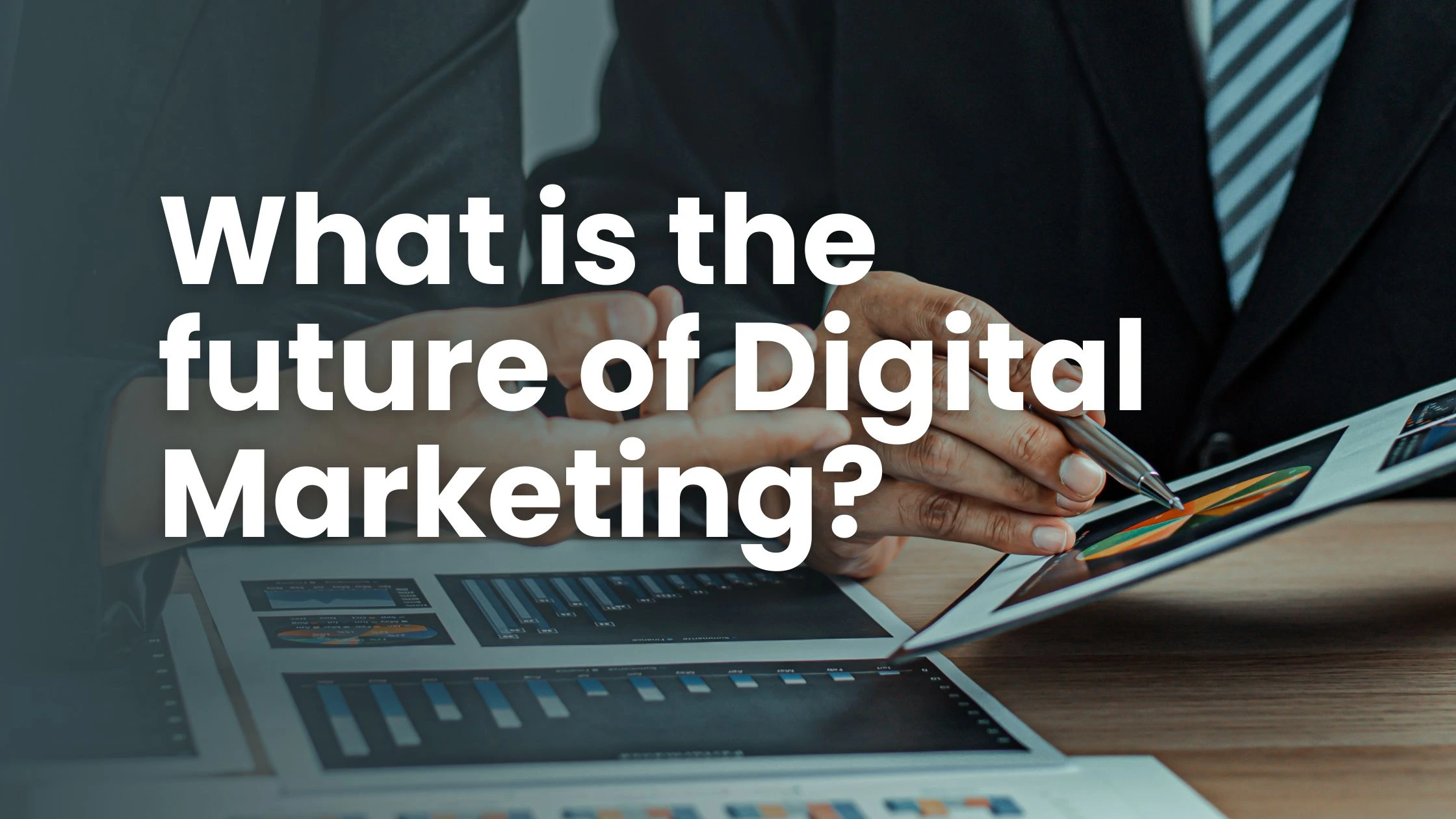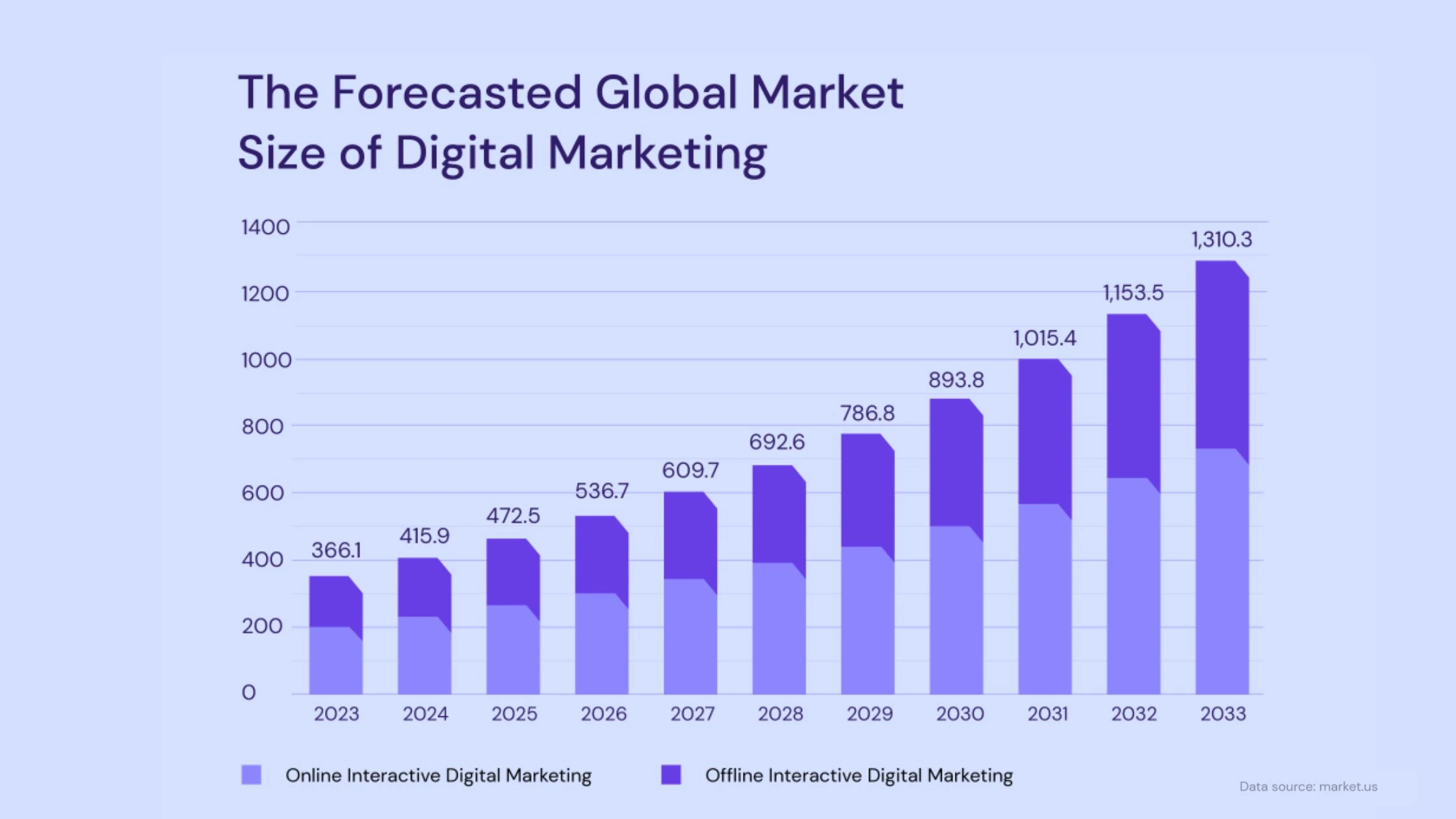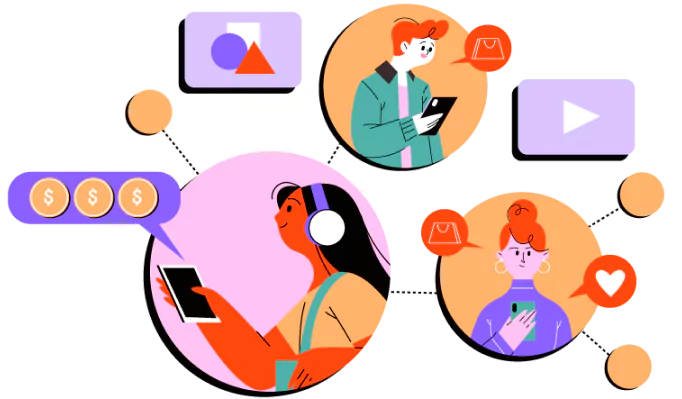

Digital Marketing is the fusion of two powerful concepts—Digital and Marketing—coming together to shape the way businesses connect with their audiences. But before we explore its future, let’s first understand what it truly means.
To break it down, we’ll start with the basics: What does digital mean? What does marketing entail? Once we’ve laid the groundwork, we’ll delve deeper into the evolving landscape of digital marketing and uncover what the future holds.
Ready to dive in? Let’s begin!
What is "Digital" in Digital Marketing?
In digital marketing, the term "digital" refers to the use of online platforms, electronic devices, and internet-based technologies to promote products, services, and brands. Unlike traditional marketing, digital marketing leverages the power of the internet to reach a global audience in real time.
Key Elements of "Digital" in Digital Marketing
1. Online Presence & Platforms: Digital marketing takes place on various internet-based platforms, including:
- • Websites and blogs
- • Search engines (Google, Bing)
- • Social media platforms (Facebook, Instagram, LinkedIn, Twitter, TikTok)
- • E-commerce marketplaces (Amazon, eBay, Shopify)
2. Internet-Driven Advertising & Communication: Digital marketing relies on electronic communication and advertising channels, such as:
- • Search Engine Optimization (SEO) – Improving website visibility on search engines
- • Pay-Per-Click (PPC) Advertising – Running paid ads on Google, Facebook, and other platforms
- • Email Marketing – Sending targeted emails for promotions, newsletters, and updates
- • Social Media Marketing – Engaging with customers through social networks
- • Content Marketing – Creating and sharing valuable online content (blogs, videos, infographics)
3. Data & Analytics: Digital marketing is powered by real-time data and analytics, allowing businesses to:
- • Track user behaviour and engagement
- • Measure campaign performance
- • Personalize marketing efforts based on customer insights
4. Automation & AI Integration: Digital marketing uses automation tools and artificial intelligence (AI) to optimize campaigns. Examples include:
- • AI-powered chatbots for customer service
- • Automated email marketing campaigns
- • AI-driven ad targeting based on user preferences
5. Accessibility & Mobility: With the rise of smartphones and mobile apps, digital marketing allows businesses to reach consumers anytime, anywhere, through:
- • Mobile-optimized websites
- • In-app advertising
- • SMS and push notifications
What Is Marketing?
Marketing is the process of promoting, selling, and distributing products or services to the right audience. It involves understanding customer needs, creating value, and building relationships to drive business growth.
Key Goals of Marketing:
- • Attract customers by increasing awareness of a product or service.
- • Engage and educate potential buyers with valuable content and solutions.
- • Convert prospects into loyal customers through effective strategies.
Types of Marketing
1. Traditional Marketing: Traditional marketing includes offline methods such as television ads, billboards, newspapers, radio, and direct mail.
Example: A soft drink company running a commercial during a major sports event.
2. Digital Marketing: Digital marketing uses online channels such as social media, websites, email, and search engines to reach customers.
Example: A fitness brand promoting new workout gear through Facebook and Google Ads.
3. Content Marketing: Content marketing focuses on creating and sharing blogs, videos, infographics, and guides to educate and engage customers.
Example: A software company publishing free tutorials and industry insights to attract potential users.
4. Social Media Marketing: Social media marketing leverages platforms like Facebook, Instagram, LinkedIn, Twitter, and TikTok to build brand presence and connect with audiences.
Example: A coffee brand launching an interactive Instagram campaign to showcase new Flavors.
5. Influencer Marketing: Influencer marketing involves collaborating with social media influencers and content creators to promote products.
Example: A skincare company working with beauty vloggers to review and recommend its products.
6. SEO & Search Marketing: Search Engine Optimization (SEO) and search marketing optimize content to rank higher on search engines like Google and drive organic traffic.
Example: A travel website appearing on the first page of search results for "best summer vacation spots."
What is Digital Marketing
Digital marketing refers to the use of digital channels, platforms, and technologies to promote products, services, or brands to a target audience. It encompasses a wide range of online tactics and strategies aimed at reaching and engaging consumers through various digital mediums such as websites, search engines, social media, email, mobile apps, and more. Digital marketing techniques include search engine optimization (SEO), content marketing, social media marketing, email marketing, pay-per-click (PPC) advertising, and others. The goal of digital marketing is to connect with potential customers, drive traffic, generate leads, and ultimately, increase sales and revenue for businesses in the online realm.
In recent years, advancements in technology such as artificial intelligence (AI), machine learning, and big data analytics have revolutionized digital marketing. Marketers now have access to sophisticated tools and platforms that enable them to analyze consumer behavior, personalize marketing messages, and measure the effectiveness of their campaigns with greater precision.
The Future of Digital Marketing: Trends and Predictions

Digital marketing has undergone significant evolution over the years, and as we move into the future, several trends are poised to shape the landscape even further. From the rise of artificial intelligence to the increasing importance of personalized experiences, here's a glimpse into what the future holds for digital marketing.
1. AI-Powered Marketing:
AI-powered marketing uses Artificial Intelligence (AI), Machine Learning (ML), and Data Analytics to optimize marketing efforts. It helps businesses automate tasks, analyze vast amounts of data, personalize content, and improve customer interactions—leading to higher engagement, better targeting, and increased ROI.
- How It Works:
- • AI chatbots handle customer queries and lead generation.
- • AI-powered recommendation engines suggest products based on user behaviour.
- • Automated email marketing with AI-generated subject lines for higher engagement.
- Example:
- • Amazon uses AI to recommend products based on browsing history.
- • ChatGPT-powered chatbots assist customers on websites like Shopify stores.
- Impact:
- • Reduces manual work.
- • Increases customer engagement and conversion rates.
2. Voice Search Optimization:
Voice Search Optimization (VSO) is the process of optimizing your website and content so that it appears in voice search results on devices like Google Assistant, Siri, Alexa, and Cortana. Since people search differently when speaking than when typing, businesses need to adapt their SEO strategies to capture voice search traffic.
- How It Works:
- • People search differently when speaking. Example: Instead of typing "best pizza NYC," they say, "Where can I find the best pizza near me?"
- • Businesses should optimize for long-tail keywords and conversational phrases.
- Example:
- • Domino’s Pizza allows customers to order through Alexa and Google Assistant.
- • Local businesses optimize their Google My Business profiles to appear in voice searches.
- Impact:
- • Increases local business visibility.
- • Helps businesses reach mobile users efficiently.
3. Video & Short-Form Content:
Video & short-form content refers to brief, engaging videos (typically 15–60 seconds) designed to capture attention quickly and boost engagement. These videos are widely used on platforms like: YouTube Shorts, Instagram Reels, TikTok, Facebook Reels, Snapchat Spotlight.
- How It Works:
- • People prefer bite-sized, engaging videos over text-based content.
- • Brands use videos for product promotions, storytelling, and tutorials.
- Example:
- • Nike uses TikTok and Instagram Reels for product demos.
- • Gymshark grew its brand through influencer-led workout videos on YouTube Shorts.
- Impact:
- • Higher engagement and shareability.
- • More organic reach compared to static posts.
4. Metaverse & AR/VR Marketing:
Metaverse & AR/VR Marketing involves using Augmented Reality (AR), Virtual Reality (VR), and digital metaverse spaces to create immersive brand experiences. It allows businesses to engage customers in virtual worlds, interactive 3D environments, and digital storefronts.
- How It Works:
- • Virtual stores in the Metaverse allow users to "walk" through a store.
- • Augmented Reality (AR) lets users "try before they buy" (e.g., virtual try-on).
- Example:
- • Nike’s Nikeland (in Roblox) allows users to explore and buy virtual sneakers.
- • IKEA Place App lets customers see how furniture fits in their home using AR.
- Impact:
- • Enhances online shopping experience.
- • Increases brand interaction in a futuristic way.
5. Influencer & Community Marketing:
Influencer & Community Marketing is a strategy where brands collaborate with social media influencers or online communities to promote products, services, and brand awareness. Instead of traditional ads, businesses use trusted voices and engaged communities to reach their audience authentically.
- How It Works:
- • Micro-influencers (5k–50k followers) have high trust among their audience.
- • Brand ambassadors promote products authentically, leading to more conversions.
- Example:
- • Fashion Nova relies on Instagram influencers instead of big celebrity endorsements.
- • GoPro built a community where users share content using their cameras.
- Impact:
- • More authentic and trustworthy than paid ads.
- • Higher ROI than traditional influencer marketing.
6. Blockchain & Web3 Marketing:
Blockchain & Web3 Marketing refers to decentralized digital marketing strategies that leverage blockchain technology, cryptocurrencies, NFTs, and smart contracts to create transparent, trust-based, and community-driven brand experiences.
- How It Works:
- • NFTs (Non-Fungible Tokens) can be used for brand loyalty programs.
- • Smart contracts ensure advertising transparency and reduce fraud.
- Example:
- • Coca-Cola launched NFTs for exclusive merchandise.
- • Brave Browser rewards users for watching ads using BAT (Basic Attention Token).
- Impact:
- • Reduces ad fraud.
- • Gives users more control over their data.
7. Programmatic & Predictive Advertising:
Programmatic & Predictive Advertising uses AI, machine learning, and big data to automate ad buying and predict consumer behaviour for better targeting and higher ROI.
- How It Works:
- • AI analyses user behaviour and places personalized ads automatically.
- • Predictive analytics anticipates user needs and serves ads accordingly.
- Example:
- • Google Ads & Facebook Ads use machine learning for real-time bid adjustments.
- • Spotify serves personalized ads based on listening habits.
- Impact:
- • Reduces wasted ad spend.
- • Increases ad relevance and click-through rates.
8. Hyper-Personalization:
Hyper-personalization is an advanced marketing strategy that uses AI, machine learning, and real-time data to deliver ultra-tailored content, product recommendations, and ads based on an individual's behaviour, preferences, and past interactions.
- How It Works:
- • AI tracks user interactions and customizes content accordingly.
- • Personalized product recommendations improve sales.
- Example:
- • Netflix suggests shows based on viewing history.
- • Amazon personalizes homepage content for each visitor.
- Impact:
- • Increases engagement and retention.
- • Makes marketing more relevant to users.
9. Privacy-Focused Marketing:
Privacy-focused marketing is a strategy that prioritizes user data protection, transparency, and consent while delivering personalized experiences. It ensures compliance with privacy laws like GDPR, CCPA, and aligns with the growing demand for ethical data usage.
- How It Works:
- • Companies focus on email lists, direct customer relationships, and ethical tracking.
- • Businesses rely on contextual targeting instead of third-party cookies.
- Example:
- • Apple’s ATT update gives users control over ad tracking.
- • Google’s Privacy Sandbox replaces cookies with privacy-friendly tracking.
- Impact:
- • Requires businesses to rethink data collection strategies.
- • Encourages ethical marketing practices.
10. Sustainability & Ethical Marketing:
Sustainability & Ethical Marketing is a consumer-focused approach where brands promote products and services responsibly, transparently, and with minimal environmental impact. It emphasizes eco-friendly practices, social responsibility, and ethical business values to attract conscious consumers.
- How It Works:
- • Brands use eco-friendly packaging and transparent supply chains.
- • Ethical marketing focuses on honest messaging and genuine impact.
- Example:
- • Patagonia’s "Don’t Buy This Jacket" campaign encouraged responsible shopping.
- • Tesla’s marketing strategy focuses on sustainability over traditional ads.
- Impact:
- • Attracts socially conscious consumers.
- • Builds long-term brand trust.
Conclusion
In conclusion, digital marketing has emerged as a powerful and indispensable tool for businesses in the modern era. It has revolutionized the way companies connect with consumers, enabling them to reach wider audiences, engage in targeted communication, and measure the effectiveness of their marketing efforts with unprecedented accuracy.
The evolution of digital marketing, from its early beginnings with basic websites and email campaigns to the sophisticated strategies and technologies of today, reflects the dynamic nature of the digital landscape. As technology continues to advance and consumer behavior evolves, digital marketers must stay agile and adaptable, continually innovating and leveraging emerging trends to stay ahead of the competition.
In an increasingly digital world, the importance of digital marketing cannot be overstated. It has become essential for businesses of all sizes and industries to embrace digital channels and strategies to remain competitive and effectively engage with their target audience.
Ultimately, digital marketing offers limitless opportunities for businesses to grow, expand their reach, and achieve their goals. By harnessing the power of digital channels and leveraging data-driven insights, companies can unlock new avenues for success and drive sustainable growth in the digital age.
The best marketing doesn’t feel like marketing.
Tom Fishburne
Overall, the future of digital marketing will be driven by the ongoing convergence of technology and consumer expectations, and companies will need to stay on top of these trends in order to stay competitive.
Ready to take your business to the next level?
At Webhorse Studio, we specialize in cutting-edge digital marketing solutions tailored to your unique needs. Whether it’s SEO, social media marketing, PPC, or content strategy, our expert team is here to help you grow, engage, and dominate your market.
Get in touch today for a free consultation, and let’s turn your digital goals into reality!








